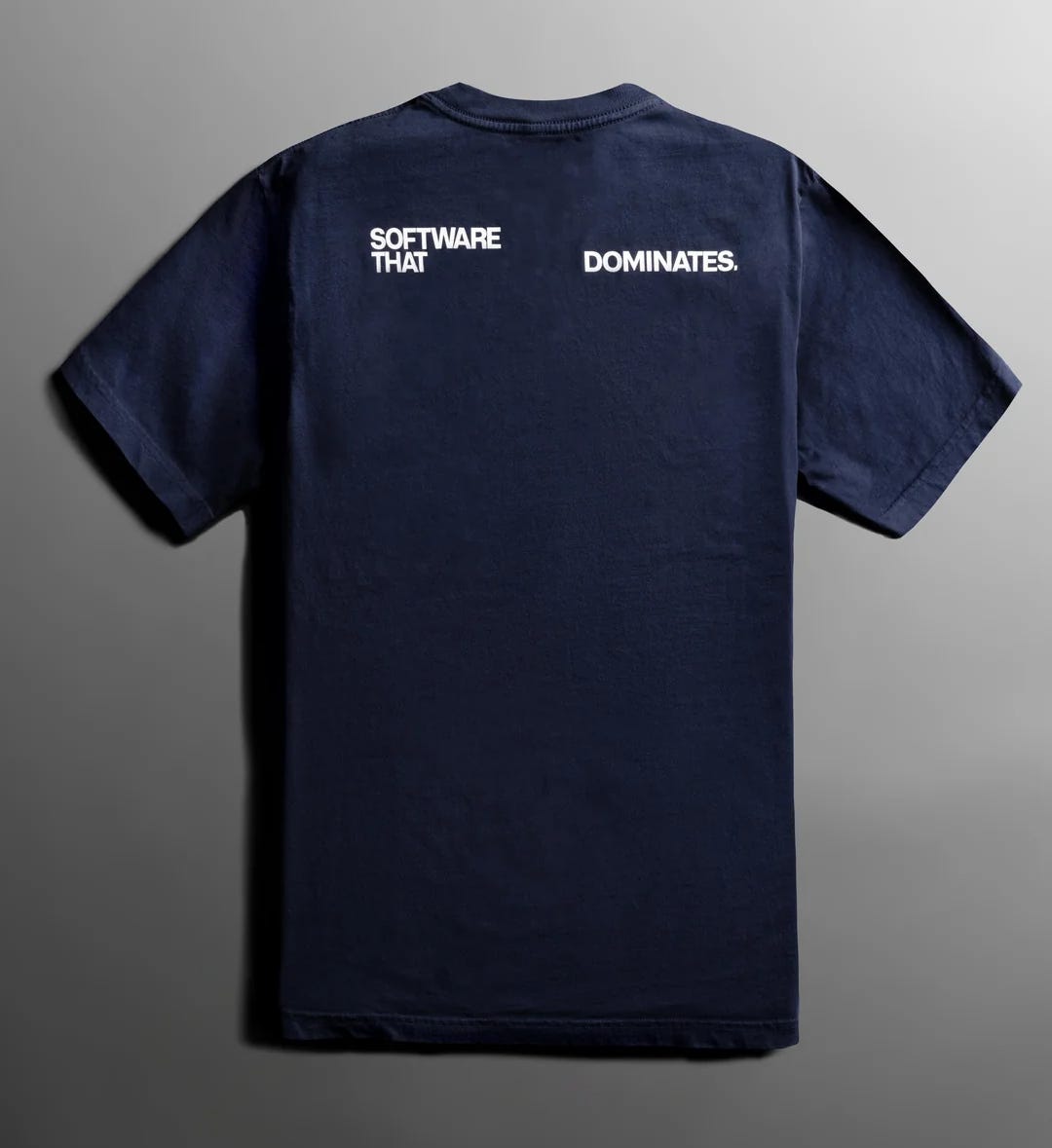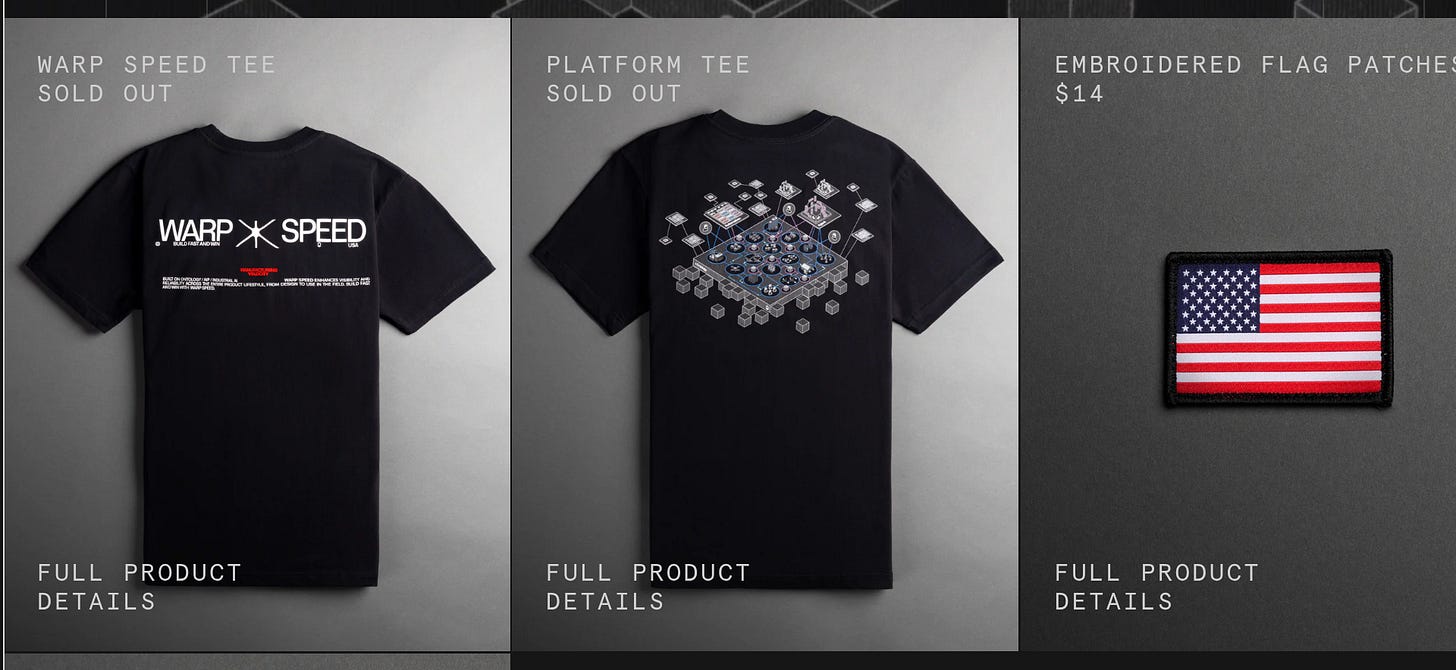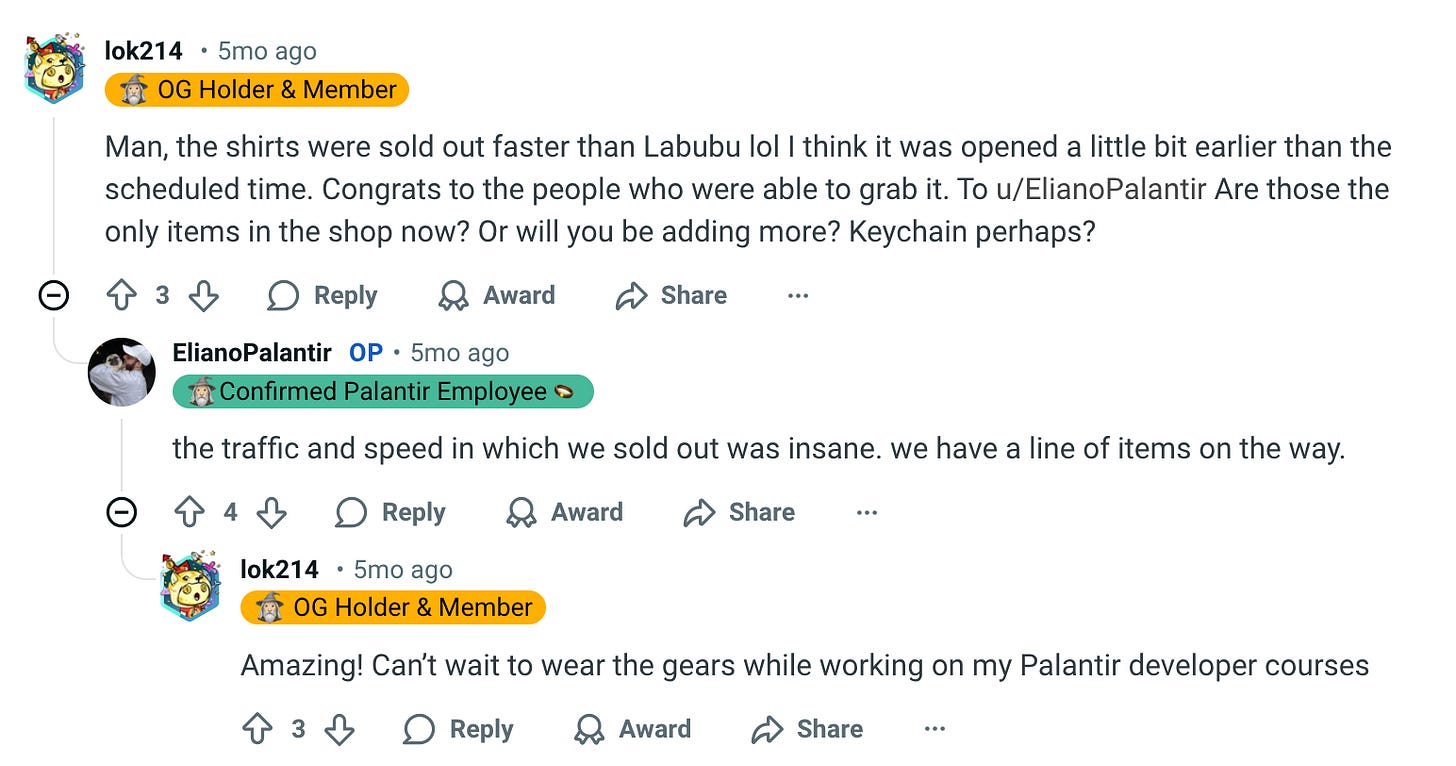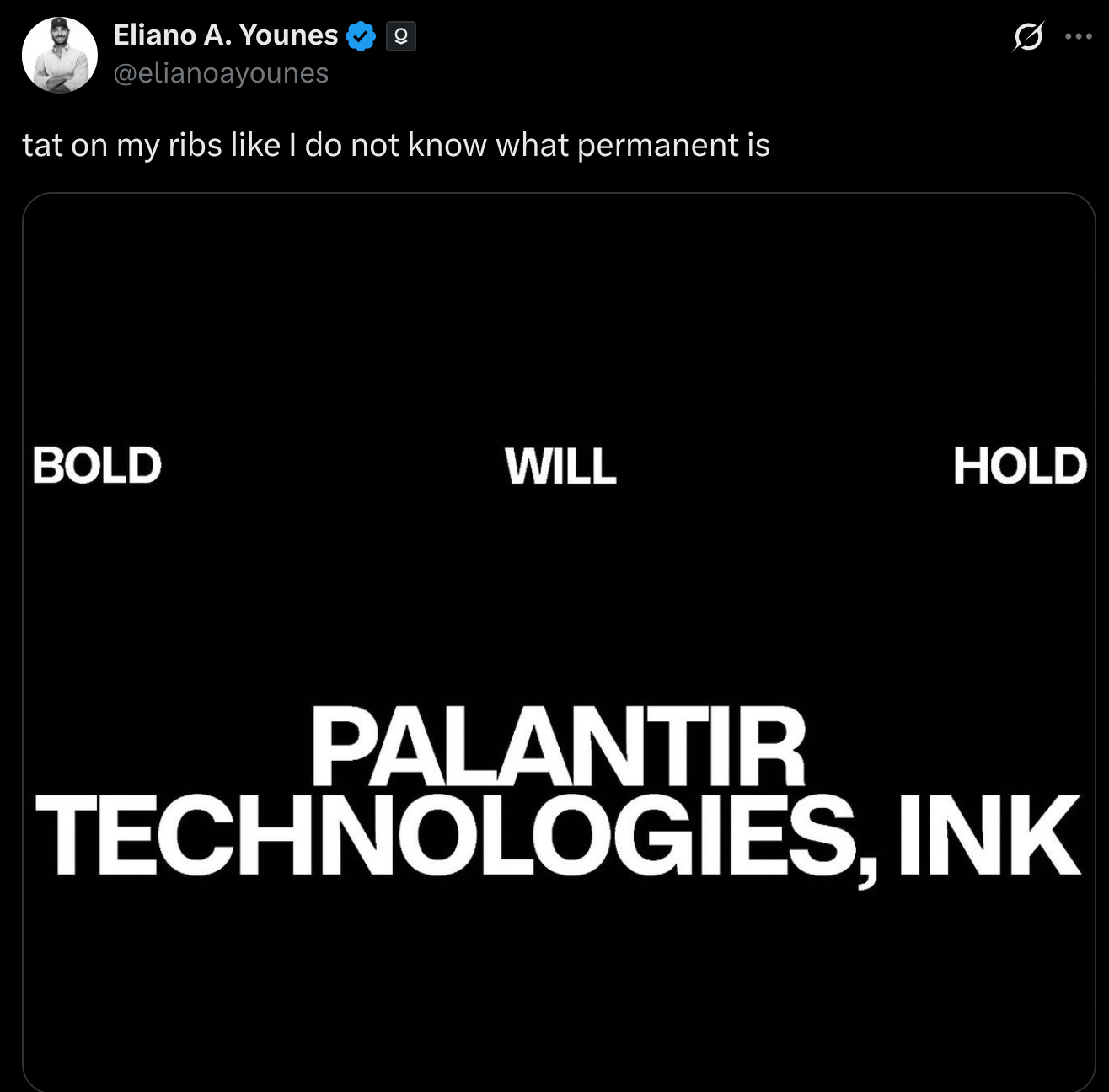Dressing the Surveillance Era: The American Promise of Palantir’s Sold Out Merch
"what's in your palantir tote bag?"
The t-shirt is a garment that is distinctly American, its mass production first hailing from the U.S. Navy in 1913 as a shirt to be worn underneath official uniforms. The patriotic and protective genes threaded from the primitive shirts of the Navy can be traced to Palantir Technologies, an American pattern recognition company most known for its powerful yet controversial use of surveillance technology. Palantir’s intelligence tools have been credited in the U.S. government’s capture of Osama Bin Laden, the tracking and containment of the coronavirus, providing the Israeli Defense Force with cellphone and social media data to aid in ‘targeted killings’ that included Gazan civilians and Palestinian journalists, and, on the U.S. homefront, equipping the U.S. government’s Immigration and Customs Enforcement (ICE) division with ImmigrationOS, a ‘migrant tracking tool’ that aggregates information from private and government databases to identify, track and capture immigrants in America. Now, the $415b company is interested in selling t-shirts.
Since opening its ‘merch store’ in 2024, Palantir has released five ‘drops’ and a ‘core capsule,’ borrowing the lexicon and limited-release cycle of American streetwear to edge and engage prospective shoppers. On its mostly sold-out online store, powered by Canadian e-commerce superpower Shopify, Palantir sells a blue and black cushioned nylon shoulder bag. The bag looks like a tote bag — a company merch staple — but fails to mention the word ‘tote,’ an obvious equivalent, in its detailed product description. This omission feels pointed, as if to deny resemblance and value alignment with the popular tote bags of America — the liberal The New Yorker tote bag, or the accessible quirk of the Trader Joe’s tote, as examples. No, the Palantir tote bag wishes to say something different about its shopper. The bag’s product description unfurls in my mind in the exaggerated machismo of Brad Pitt’s American accent in Inglorious Basterds: “Highly functional design with two interior patch pockets for small good storage… Includes Palantir chevron patch affixed to modular velcro surface on bag exterior. Cut, sewn and finished in the USA.” Even an Oxford comma was too un-American for Palantir’s merch store copywriter. The Palantir bag retails for $119 USD.
The online shop’s sold-out $65 hats and sold-out $99 shorts are also described with a military-like precision, all in on technical performance yet designed for ‘everyday pursuits.’ It’s Outdoor Voices’ Doing Things for the surveillance era. But it’s the company’s t-shirts that are the clearest billboard for Palantir’s promise to America. On the back of a now sold-out navy blue shirt are the words “SOFTWARE THAT DOMINATES.” The word “DOMINATE” appears again on another shirt, this time below the illustrated face of Palantir’s CEO, Alex Karp, in sunglasses and grey watercolour.
At first, I was confused. Unclear just who would buy this stuff and how it was sold out. But, after a quick scrub on Reddit and Twitter/X, I found its shopper nestled under various inscrutable user names, all hooked to the patriotic ambition the company posited. It turns out there are Palantir bros everywhere for those with eyes to see.
Palantir Technologies was founded by German-American venture capitalist and political advisor Peter Thiel in response to New York City’s September 11th terrorist attacks under the mission of becoming an essential technology arm for the U.S. to protect against future threats. Today, CEO Karp, who first met Thiel at Stanford Law School, says that Palantir exists to defend the West. It is estimated that the U.S. military has spent $10 billion on a 10-year enterprise contract with the company. For the past year and a half, the company has allocated a portion of its revenue to brand building through merchandising, with its sights set on becoming a beloved consumer-facing lifestyle brand, rather than just an engine for the government’s most lethal military operations. To the latter, the company has taken the tired stance of an arms dealer, more preoccupied with finishing first in an arms race than its moral implications — ‘guns don’t kill people; people kill people.’ Palantir has punted the responsibility for how its technology is deployed to its customers; Netanyahu is responsible for how Palantir’s technology is used, not Palantir, it hopes you believe. But, for a public that is becoming increasingly aware of Palantir’s operations, this is not a satisfying response. This deflection wasn’t satisfying when Facebook was revealed to have provided private user data that aided in Donald Trump's 2016 U.S. election victory, a crisis so severe that the company had to change its name to Meta. Palantir is smart enough to know that even if its investors expect a return on shareholder value, the public expects, at minimum, values. And, to this, Palantir would describe its values as American. By initiating communication with a set of people who share its vision through merchandise, Palantir can limit future reputational damage and build a base of passionate stans rather than a secretive cult. With the U.S. government as an ally and a growing population of supporters, selling Palantir t-shirts feels less of a surprise-and-delight for hardcore fans and more of a proactive PR strategy. To be an American superhero, you must not only protect but also be loved. Perhaps Karp hopes that the Palantir chevron will become synonymous with the Man of Steel’s S, worn proudly on the chests of Americans. But, maybe not. Although he was functionally a government asset, Superman was never American.
Palantir’s investment in streetwear is coming at an opportune time. The company trades on pattern recognition, but I can recognize a pattern, too. When apparel brands like American Eagle are propagating white supremacist ideals through advertisements with Sydney Sweeney, and Silicon Valley juggernauts like Mark Zuckerberg are donning streetwear, the intersection of Palantir’s nationalist agenda and superior technology feels uniquely positioned for a new set of consumers. The audience for this — whether a patriotic believer of the company’s mission, an awestruck tech-nerd, or an army brat — is likely much bigger than a typical corporate merch brand, and I suspect, regardless of their political associations, growing in size. If Palantir can unite this buying group, first with merchandise, but then under their shared vision for the West, the company might have a real shot at being seen, in the eyes of a select few, as an American superhero. For what it’s worth, Karp, who is biracial of Jewish and African American parents, identifies as a socialist. I wonder if he’s a fan of Drake. His team sure is:
With the release of lifestyle apparel, Palantir might just be the most American brand out there today. What is more American than being watched? Than being stalked? America — the home of surveillance, celebrity culture, and Hollywood, prying Karens and nosy neighbours peering over the white picket fence, the constant threat of a foreign attack, the most funded military on earth, the police’s Drone as First Responder program, the fear of being recorded, the TikTok flip the camera trend, the extraction of a phone from a pocket almost as threatening as someone pulling out a gun, WorldstarHipHop fight videos and “Twitter do your thing” doxing, GRWM, the ‘privacy as a luxury’ discourse, a damn reality TV star in the White House with an insurrection, Black death and assassinations livestreamed to our phones. A land of theatre, performance, and spectacle. Never ever ever has there been a nation so sure of its audience as America. This is what Palantir knows to be true.
Palantir might exist to defend the West, but it also exists to sell paranoia and a promise to fix it. For Americans, paranoia is split across two vulnerable populations: those who believe they need Palantir to protect them from foreign threats, and those, as seen in the vicious ICE raids, who believe they need to be protected from Palantir. The repeated word of ‘dominate’ that appears so triumphantly across its merchandise is not just a pithy marketing slogan like Nike’s Just Do It, but a considered promise to all that stands in its way. A promise to its customer, be they a t-shirt buyer or a military.
In an earnings call, Karp addressed shareholders with the following statement, ripe for a merch drop: “Palantir is here to disrupt and make the institutions we partner with the very best in the world and, when it’s necessary, scare enemies and, on occasion, kill them, too.” In other words, dominate. Palantir only functions in a world of threat, a prisoner’s dilemma where everyone presumably has their finger on a nuke. A world that is perhaps much like our own. In February, in a letter to investors, Karp quoted The Clash of Civilizations, saying that “the rise of the West was not made possible by the superiority of its ideas or values or religion... but rather by its superiority in applying organized violence.” Karp continued: “Westerners often forget this fact; non-Westerners never do.”
Thank you for reading. If it’s within your ability, please consider supporting the organizations below:
Amica Center provides legal services for individuals to help navigate the immigration system in the U.S.
International Rescue helps rebuild Gaza by providing aid to families in need.
My serialized novella ‘Come If You Want’ has arrived. Read the first chapter here:
Come If You Want - Chapter One
You are reading ‘Come If You Want,’ a serialized novella by Brendon Holder. This is the first of four chapters.
Read More LOOSEY
What is Mark Zuckerberg Wearing?
Has anyone seen how Mark Zuckerberg has been dressing lately? I was scrolling the other day and came across the following image:
In search of the perfect t-shirt and taste
I love Paris the way that only someone who doesn’t live there can: with the rose-tinted glaze of a vacation fling that you never commit to, unbothered by its impracticalities.
LOOSEY is a newsletter about culture, art, technology, and the way we live. If this is something you like, consider subscribing and sharing. Let’s be friends on Instagram.












Always look forward to your newsletter. Excellent and harrowing and succinct.
Brendan this was an incredibly insightful piece and you got to the heart (or lack thereof) of American culture when it comes to war mongering and the ever present threat of violence. Now tech bros call it disruption but we know it’s violence.